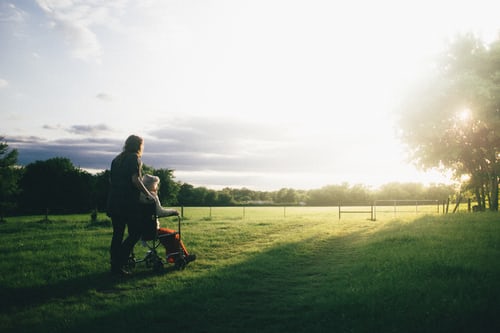How retirement villages are part of street life in the UK
The words “villages” and “street life” do not seem to mingle well. However, they play an important part on the topic of how, in the UK, retirement villages are a part of street life. We explain why. Some of the older generation (55+ and over 60 years) are no longer able to stay in their own homes but still wish to retain their privacy and remain independent. The solution is provided by Retirement Villages which offer the opportunity for such people to own or rent a property in a communal setting amidst other like-minded people. They can still retain their independence and have their privacy protected. Such retirement villages were usually located on the outskirts of cities or in rural areas to offer a quiet and peaceful environment. In some places, not many transport facilities to local towns or cities were available.
Recently, there has been a change in trend, and it is felt that it is better for retired people to be included in “city or town life”. They should be provided with easy access to local amenities and should be brought more into the city centres or suburbs to enable them to enjoy the facilities of shopping, eating out at restaurants, meeting friends in a pub or a coffee shop and enjoying public entertainment without having to travel all the way from their retirement villages outside the cities. Ask the letting agents in Sittingbourne, where some top retirement villages are situated, and they will concur.
One of the bright spots in the cloudy horizon of the pandemic was that this opportunity for city and town retirement villages was provided!
Lockdowns: The lockdowns forced many city and town stores, warehouses and hospitality units to close down, causing enormous loss of business and employment. With the uncertainty of the future, some owners took the major decision not to reopen such places but, instead, to renovate the premises for more promising outcomes such as gyms, student apartments, food corridors and even miniature golf courses. Included in this restoration drive was the formation of retirement homes.
Residing in high streets: Having some of the above facilities where huge stores once were is not the only answer to helping the economy. People are needed to avail themselves of those facilities to keep them running. A part of this need is provided by having retirement villages in the city centres. Many retired folks are financially comfortable, allowing them some extra spending money and the time to spend it. So retirement villages being part of street life works both ways – they afford the elderly the enjoyment of local amenities and help the businesses providing such facilities with income as well.
Demand: The isolation and loneliness caused by lockdowns during the pandemic have led to more elderly people wanting to be part of community living rather than being alone in their homes. This need is enhanced as people grow older. The requirement for retirement villages, which provide the answer to this need, is rising. This is especially so in high street areas, where some now-defunct properties are available for such a purpose and where the demand for offices is falling.
Security: The security provided in retirement villages, especially in city areas, is a plus point for having such properties on high streets. The elderly look for safety and security which may not be guaranteed in their individual homes but which are provided in retirement villages. Having staff available on site is an added benefit.
Green space: Renovation of commercial spaces into retirement housing adds to a generally healthy environment. The provision of garden space and trees will sequester atmospheric carbon dioxide. So, in the midst of city and town high streets, a “go green” policy can be evolved, improving overall health conditions.
Conclusion: In the present situation, where avenues are being explored to improve the economy, especially on the main high streets where it has been badly hit, retirement villages provide a way for long term income. However, there are many factors to consider when investing in such a property. Legal advice is essential with updated information on fees and taxes. Tax regulations will need to be conformed to. Clarification should be sought for any relief in business rates (non-domestic property tax). High quality of infrastructure, including norms for quality, safety, security, maintenance and other facilities, will have to be met. Getting involved with the relevant Retirement Village Associations would be helpful. The expertise and advice in all these areas provided by a professional real estate agent will be invaluable.

